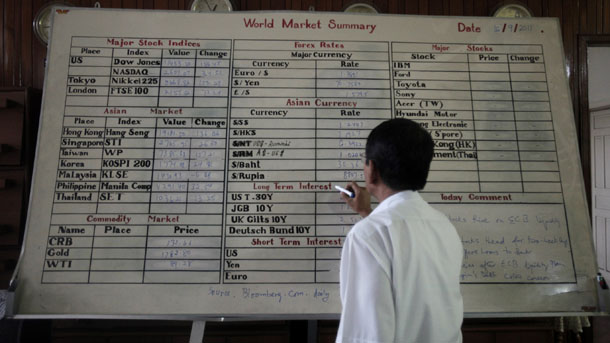With the help of the Tokyo Stock Exchange (TSE) and the Daiwa Group, Burma is preparing to establish its first stock exchange—a move that will enable it to compete more effectively when the Asean Economic Community becomes a reality in 2015.
With fewer than 100 of the country’s more than thirty thousand privately owned companies currently offering shares to investors, most businesses are forced to rely on credit to expand. With a stock market, many more will finally be able to find the funding they need to unleash their potential.
“The amount of investment from the stock market is far larger than the amount that the banks can lend,” explained Koichiro Miyahara, senior executive officer of the Tokyo Stock Exchange. “A stock market is essential for getting the investment that businesses need in order to expand. Local Burmese firms have to take many steps to prepare to participate in the stock market.”
To become publicly listed, companies must meet certain requirements. Besides demonstrating that they are financially sound, they must declare how much property they own, how much capital they posses, their operation system and their future business plan.
But companies are not the only ones that needs to get ready for an influx of investment. The government must also introduce laws to regulate the capital market. To this end, it has recently signed a memorandum of understanding with the Japanese Foreign Ministry’s Policy Research Institute.
“The security exchange law is essential for the development of the capital market,” said Maung Maung Win, the vice president of Burma’s Central Bank, adding that a draft law has already been completed and will be sent to Parliament for discussion and confirmation.
One of the benefits of a new stock market is that it will challenge the supremacy of cronies of the former junta, who will have to declare their assets if they want to be publicly listed. Companies that can’t or won’t meet this requirement will face stiff competition from those that do.
According to officials from the TSE, the Burmese stock exchange market will use scripless trading for stocks and bonds. That means that transaction reports will be issued electronically, thereby avoiding the problems of lost and fake paper stocks. But it also means that Burma will have to upgrade its IT sector.
“To operate with the scripless trading system, security companies need to have improved IT systems. We will discuss with the Central Bank and local firms about what kind of share will be used in Burma,” said Kazama Suzuki, spokesperson for the Daiwa Research Institute.
The grand design for the Burmese stock exchange market is scheduled to be completed sometime later this year, according to the TSE. Business regulations (for listing companies and trading infrastructure) and system development will be ready by 2014 and mid-2015, respectively. Tokyo will also support human resources development.
“We have been doing financial and banking system research in Burma for the last two years. Now we are going to push ahead with setting up a stock exchange,” said Daiwa’s Suzuki.

















